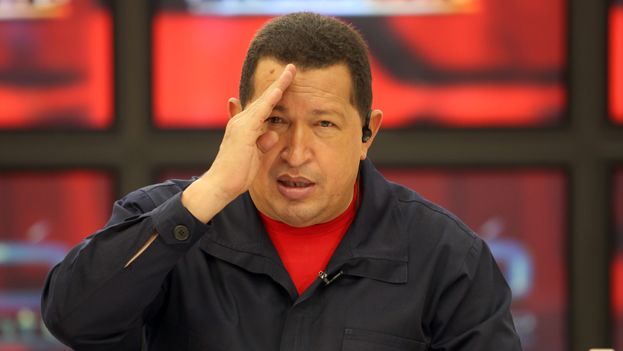
![]() 14ymedio, Havana, 25 January 2016 — “We reject the infamy of trying to create a similarity between socialism and the Chavez model,” says an article published this Sunday by the Venezuelan journalist Leon Moraria on the site Aporrea, a digital page that is defined as a space identified with “the process of revolutionary and democratic transformation” in Venezuela.
14ymedio, Havana, 25 January 2016 — “We reject the infamy of trying to create a similarity between socialism and the Chavez model,” says an article published this Sunday by the Venezuelan journalist Leon Moraria on the site Aporrea, a digital page that is defined as a space identified with “the process of revolutionary and democratic transformation” in Venezuela.
Moraria’s article joins others that have appeared on the site with strong critiques from the Venezuelan left of Nicolas Maduro’s management. Moraria, also a social activist and defender of the rights of miners, called for putting a name on the failed model that has brought the oil-rich country to a deep economic and social crisis.
The writer refers to the recent speeches of the deputies in the National Assembly, of the opposition majority, in which they make constant refernces to the ineptitude of the current system. A situation that Moraria exemplifies with figures such as the 76% increase in poverty, galloping annual inflation that exceeds 300%, and an unemployment rate of over 50%, which condemns the majority of Venezuelans to working in the informal economy.
The enumeration of the Venezuelan disaster includes, according to the socialist, the shortage of some 60% in products that make up the daily diet; the paralyzation of more than 60% of urban and interurban transit for lack of parts, tires, abd batteries, as well as small and medium industry paralyzed by lack of raw materials, and agriculture abandoned for lack of inputs.
So Moraria questions whether the “described disaster” is “manna from heaven” or the consequences of a “failed economic model.” A question that he responds to by affirming that the situation “did not exist 17 year ago,” and “did not arise by chance nor because of domestic businesses nor imperialism,” but “is caused the government itself.”
His harsh critiques join those of former Chavez followers, such as Javier Antonio Vivas Santana, who in December called for the resignation of Nicolas Maduro in an article also published in Aporrea. On that occasion, the author of the article predicted that if the resignation does not occur, the Venezuelan leaders could “kill the Bolivarian revolution.”
Moraria believes that “devaluing the currency is the best factory of poverty yet invented.” A situation that the government decorates “with gifts, subsidies for everything (gas, food, medicine), plus political/populist handouts financed by oil revenues,” but that, “is not underpinned by economic development, as it should be.”
The activitist is incisive when noting that these “subsidies are turned unto alms, confusing social justice with charity,” and he passionately affirms that, “Charity is not socialism! Socialism is revolutionary transformation!”
The article reaches its highest level of criticism when he says that this “economic disaster has a name and surname: Hugo Chavez, the Chavismo ideologue, based on demagogic populism, ‘hyper-leadership’ and a cult of personality.” A political ideology adorned “with Bible quotes, Bolivarians, Marxists, Christian Socialists, fascists, neo-Nazis, militarists, in a very peculiar ideological syncretism.”
“The economic disaster is the legacy of Chavez,” concludes Moraria, who believes that the deterioration Venezuela is experiencing is “so perfect, so well prepared” that it could only be the work of a “genius” like the “eternal commander.” A president that governs “with enabling laws, approved by a complacent unanimity or by a parliamentary majority,” he adds.
The left-wing journalist notes that the current Venezuelan government “is not revolutionary, nor Bolivarian, much less socialist.” He sees it a system of the military, “with the military and for the military,” and warns that “it is a disgrace to say that Chavismo is socialism.”
